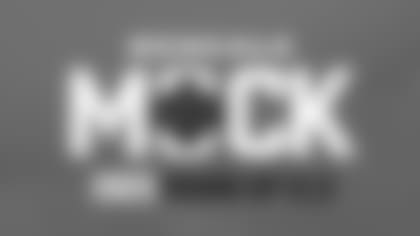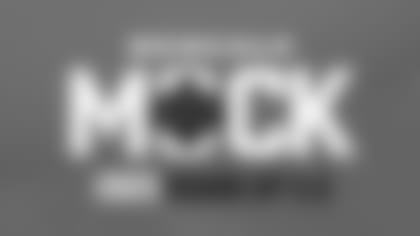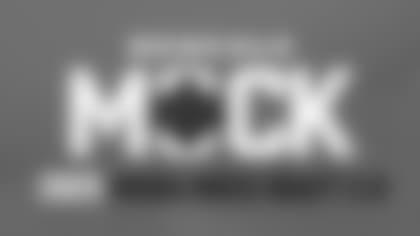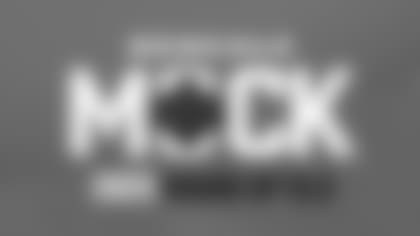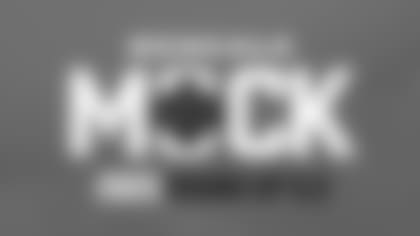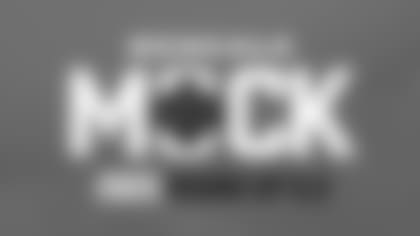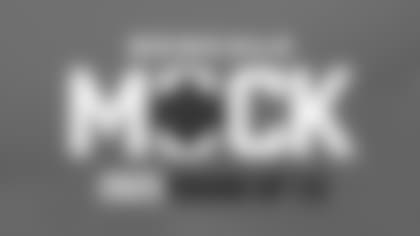BRIAN CALLAHAN
Offensive coordinator
and
FRANK POLLACK
Offensive line coach/run game coordinator
What did you guys like about Cordell Volson that made you want to draft him in the fourth round?
Callahan: "(He's) a versatile player. He's got a lot of different things he can do well (and) a lot of good measurables. We're excited about the person (he is), the makeup — all those type of things. I'll let Frank talk more specifics about it, but we're excited to have him. He'll be a nice addition to the offensive line room and provide some more competition, which (is what) we're always looking for."
What do you project him as right now position-wise?
Pollack: "(I see him) going inside at a guard, (and) he can bump out to tackle."
What specifically about his game is it that you really like?
Pollack: "He's tough, he's physical, and he's a finisher. You'll see him pull out on a perimeter and run pretty well. He's productive out in space when he did pull. He comes from a winning team (and) winning culture. You love his intangibles. He's a worker — that's how he was raised, (which is) what you're looking for."
He played mostly at tackle, but he did play a couple at guard. Does that tape at least help you project that he can play inside or is it the traits he has?
Pollack: "It's a little bit of both. He's got the play strength to go down inside and to play (out in) space and (on the) edge. He's got the feet to play at this level as well, so I'm excited about this guy. As Brian mentioned, he's got high intangibles that you can hang your hat on. He's got a chance to develop and has upside."
How did you guys get to know him? Was it NFL Combine interviews, Zoom calls?
Pollack: "Yeah, I did some Zooms with this guy. (He) just jumps out at you doing some research that way and just really had a good Zoom visit with him."
When you look at the traits you want from a guard, does he have a similar set of skills? Is he like Hakeem Adeniji or Jackson Carman, or any other guys you already have on your roster? Or does he bring something different?
Pollack: "Yeah. He's a good solid player. He's got good O-line traits like all those guys have. (There's) nothing out of the ordinary (or) anything different, per se. (He's) just a great guy to enter the room for competition. We've got a nice, young group we've starting to formulate (over) the last couple years, and it's going to be great in that regard."
Is it more challenging to evaluate a smaller school guy based on the competition he faced? What goes into an evaluation like that?
Pollack: "Yeah, it is. It is a little bit challenging, because (of) the big degree difficulty, if you will, and the level of competition. But it was kind of fun watching North Dakota State, because they're really pro-style in their offense. You see a lot of what you're going to ask him to do, (and) he's already kind of doing it. From that way, it's a little bit easier I would say than watching some of these guys from these spread systems, even at these bigger universities, (because) they never have their hands down in the dirt. They really don't do a lot but just kind of run side-to-side and get in the way."
Could he compete for the left guard starting spot in Week 1?
Pollack: "Everybody in that room could compete for any job. If you don't have that mindset, it doesn't matter where you are on that depth chart. My modus operandi is you have to earn it every day, you have to earn it every year. I don't care where you're coming from, where you're drafted, or what you did last year. It's all about what you're doing today. That's what makes this league so great."
How important was for you guys to address offensive line at some point in this class and continue to develop that room, even though you added what you added in free agency?
Callahan: "I think you're always looking to add young players to your offensive line room. It's something that Frank would talk about all the time. We're trying to add guys every year that we think can develop and help and (add) competition — guys get better and guys rise. You hope to find a good starting group and good quality depth. That's what we're looking for.
"Those guys that we have in our room now are up to the task and challenge of competing, and we felt like we would be able to add a quality player at some point in this draft, the way that the board falls and where guys go and how they go and where we were picking. At the end of these rounds, a lot of good players have gotten drafted before, and we've had a chance to pick as well, (so it would) just to be dependent on the spot and where we felt (good) about it.
"We had targeted Volson as a guy that would fit somewhere here, and this last day in the draft, it just came up that this was the spot for him. I don't know that he'd probably make it much longer if he was still on the board — I know a lot of people around the league had a high regard for him. That's just how it goes with the draft. You never know exactly when and where you're going to add pieces. (It) depends on where your grades have guys, and where the other positions fall, but we were certainly hoping to add a lineman earlier than later. (Volson is) someone that we felt like could really come in and compete. We feel good about Volson and what he brings to us."
With the past guys you've picked who came from small schools in the last couple of drafts, they've played a ton games. Is that a factor in trying to counter competition or does that matter?
Callahan: "I think it does matter to some degree. You want guys who are experienced football players. You're always going to take a player that's got 45 starts versus a guy with one year of production. At least you see a guy who consistently produces over his career, and those are the types of players that jump out at you. You find them a little bit more refined, occasionally. But I wouldn't say that it makes or breaks a player. It doesn't make a difference whether it's a big school or a small school. We try to identify the traits that we like in players, the personalities that we like in players, and then we go from there. There's always going to be an adjustment, particularly at offensive line. As you guys see all the time, it's not an easy position to come in early and play. It's hard. It takes time and development and work. I think that's what you're hoping for is guys who are able to come in and ascend quickly. And I think Volson has the capability to do that, but I don't know that the competition in small schools or (in number of) starts or anything like that matter necessarily in the long run. It's just about what they do when they get here, and that's really what you hope for. But certainly, guys who play more football are always easier to evaluate, and they tend to have a little bit of a leg up because of their experience."
When you look at the acquisitions you got in free agency, it seems left guard is the spot that you look at with the biggest room for improvement. Going into this process, did you guys have any desire to just draft a guard, or did you look at overall traits?
Pollack: "I think it's a combination. From my perspective as the offensive line coach — focusing on the offensive line, not having to deal with the whole roster —for me it's a guy who's the best offensive lineman that's available, and if he can truly go inside. There's a lot of guys who are tackles who don't play inside. They don't have the power, strength or the anchor to go inside. So, it doesn't really matter if he was purely a guard or a tackle who moved inside. It's really just a guy who, in my opinion, is the best offensive lineman available. Some of those guys will fluctuate, where in the draft, if someone fell to us who was just a tackle, that would be a different conversation you'd have to have at that point, as opposed to a guy who's more interior. To me, an interior need was a little more of a glaring need, for lack of a better term."
Why do you think he can go inside?
Pollack: "The toughness he plays with. The power he plays with. The strength he plays with. He'd have no problem going inside."
Do you see similarities in him and Jackson Carman, because obviously Jackson, too, was a tackle in college ...
Pollack: "I would say that Jackson is maybe just a little more athletic overall — just looking pure at testing numbers, if you will. It can make a difference there, but he's a good football player."
Have you seen intangibles being of more importance in the Bengals front office compared to other teams you've worked with?
Pollack: "For me, that's like Line 1, Line 2, or Line 3 at worst, in my reign. You got to have guys that have intangibles — the work ethic and what they are made of. What's their mental toughness, their grit? Can they learn, can they process fast with the way we run our offense? The defenses are going to move and shift, and we are going to invite them to do that with our motions that we utilize. You have to be able to think fast, adjust and then go play fast. All of that goes into the makeup. We're not just throwing them a card and asking them to go block that guy. There's a lot of guys who excel at that, but once it goes live and the pictures start changing on them, their play goes down — so that's huge to me — when a guy needs to develop, he's not going to develop to the maximum ability. He doesn't have all of the intangibles. This league is a son of a you-know-what, and to make it, you have to have some you-know-what in your neck. You have to have some grit, or you're not going to make it. I've been in this a long time as a player — a horrible player (laughs) — and as a coach, and there are guys you'd see come and go that are so talented and have off-the-chart measurables and you're like, 'Man, how come that guy didn't make it?' Because he doesn't have the other stuff. And I'm just talking offensive line. It's critical. If you don't have that, you have no chance. I don't care how big you are, how pretty you look, how fast you are. None of that matters if you don't have a little (stuff) in your neck. That's just the reality of that."
How do you gage that? Does it show up on film? Does it show up through Zoom?
Pollack: "It shows on film, and it shows when you talk to them and ask them questions. There are some personality assessments that teams and the league utilize that we have access to which exposes you to that and causes you to dig further into it a little bit more. You talk to their position coaches or (other) coaches on staff at their colleges. That's how you find out. You don't really know until the very end when they actually get in here. You do your best assessment on them and find out what they are made of, (whether you) can work on their adversity, all that kind of stuff."
Is a tell-tale sign them finishing plays?
Pollack: "That's a huge part of it. Does he love ball? You know as good as anyone what's that's all about. So, absolutely. He finishes and he's physical. In their Montana State game, you see him finishing guys. He's what you're looking for in a young player."
There has been a lot of focus on the offensive line throughout free agency. How excited are you to see how much of a step forward this offensive line can take in front of QB Joe Burrow this year?
Callahan: "I can't wait to see these guys get together. It's a collection of personalities that we're really high on that we think are going to mesh together great. Between (Ted) Karras and (Alex) Kappa, those two have been in town and have already been working out. Those are the guys we are excited to see. LC (La'el Collins) will be here some point soon, and to see those guys get in a room and start to compete and build that camaraderie. And I think when you talk to Frank, one of the biggest parts of the offensive line is the way those five starters come together and the persona they take on together as a unit and as a room — it is really important. I think we've added the types of players that are going to contribute to bolstering that mentality we are looking for. I think that's going to really raise the level of the guys in that room and get the best out of all of them. I'm excited for that competition to start. I'm excited for those guys to get together, and I can't wait to see what our line looks like this year compared to what we've had in the past. I'm really excited about that. I think Frank probably feels the same way with the additions we've made. It's exciting. I'm sure Frank can't wait to get his hands on them all together, get to coaching and getting back on the grass. I'm excited. I think we've done a lot of great things for that room over the course of the offseason."
The NFL has always found players in smaller schools, but with the digital technology and social media nowadays, are you getting more intel or just getting the intel faster?
Callahan: "I would say the availability of information is everywhere. The adage has been true forever — that if you're good enough you will get found, people will find you. These scouts travel all over the country. They do a great job. They find players, they get the process started two or three years out. They're well-aware of who's coming up and who's next. These schools nowadays, the profile from TV, and all those things have been raised. You see them on TV more often. You see their schools, their colors. It's more widely recognizable than maybe it was 20 years ago. But certainly because of the TV and social media and all that stuff, you are seeing more and more players that maybe necessarily as coaching staffs and scouting staffs have always seen, but maybe it's just more aware publicly now than it has been. That's probably where it feels like there's more of it. But certainly the guys do a great job of lining up the players regardless of school. They do their diligence and their homework on all these places, and they go to every school across the country and really get a feel for these rosters as these kids are coming up through their processes. By the time they get to draft eligible, they have a really good feel on who's coming out and who's available, regardless of the size of the school. I think there's definitely a thoroughness to it, and I think you're seeing a lot of smaller school guys probably getting an opportunity that maybe they didn't used to get — recognition and such."
How does his scheme and technique translate to what you're going to expect him to do coming here at this level?
Pollack: "Yeah, they run a lot of pro-style stuff in the run game. They're dotting the I, they're running to two-tight end sets on the wing — he's pulling out on perimeter stuff. It's all things that we do. He does wide zone, he does tight zone, and he did a little gap scheme to compliment that stuff. You see him on tape doing everything that we're going to want to do with him here as well. He should have an easy transition from that standpoint. It won't be real foreign to him like some of these other kids that come in from different systems. That definitely was fun to watch. It eased my decision to get more excited about this guy. It's easy to watch his college tape."
Is he good with his hands? Do you like the way he uses his hands?
Pollack: "Yeah, I do like the way he uses his hands. He does use his hands well. There are a lot of things he needs to continue to improve on and get better at, obviously. There's a reason why I think he's maybe a little bit better suited to go in at guard than stay out at a tackle. But that does not take away from him as a player or as an offensive lineman at all."
Just to circle back a bit, what does it mean to have a little 'you know what' in your neck?
Pollack: "What do you mean by that? I think its self-explanatory (laughs). Have you seen the D-linemen we have to go against every day (laughs)? You've got to have a little something in your neck to give them a little shove at the end of a block and not let them give you the shove. Maybe I just reflect on my own experience because I wasn't a very good player — how hard it was to play in this league. It's hard. You're going to have to overcome some adversity and work through some ups and downs. A lot of these kids have never faced that, so how are you going to handle it when it hits you right in the mouth, right? Nobody cares where you came from or what your college career was or how many stars you had. Nobody (cares) — doesn't matter. You're playing against grown (up) men, who are trying to take your job. These guys are married with kids. They don't care if you're some hot-shot, 22-year-old. You know what I mean? To me, as a coach, I feel like it's my obligation to promote that because the men in the room that I coach now have earned the right. So the new kid coming in, he's got to earn the right to be in the room and compete with those guys. I've seen a lot of guys who can't handle the business side. This is the best business in the world, and it's the ugliest, nastiest, coldest business in the world. It is what it is; get over it. Here's a tissue ... go cry in the corner and let's go (laughs). If you can't handle that, you're not going to last. I remember back in my years, (there were) guys that come in the locker room, they couldn't handle that. They were talented guys, but they just couldn't handle the business. North Dallas Forty had a great scene in there about 'I call it a business, you call it a game.' I like sharing that scene with my guys because it's both. You've got to understand it, deal with it and move on. It is what it is."
Frank, what is going to be the biggest challenge for this guy to go from outside to inside in the pros in this division?
Pollack: "Well he's going against different cats. Those guys are insane. That Georgia guy is 340 pounds and ran a 4.7 (laughs)? That's ridiculous. That to me is the biggest difference — the guys he's going to go against."
How comfortable are both of you with the guys you have to compete at left guard right now?
Callahan: "Yeah, as of right now we feel good about those guys and what they've done so far, and then the improvements that they have to make. There's certainly competition — it's a good thing. We can't sit here and say we know who that guy's going to be and that's the best part. You're going to find guys that are going to be able to see who's going to rise. Like Frank said, they're all going to get tested and we're going to find out who they best one is. That guy that walks out there opening weekend will have earned that job, and he will have earned it because he played well and he did all the things that we're looking for those guys to do at that spot. I think it's exciting. I think it's going to be a fun competition to watch. The door is open for all these guys and we're looking for them all to improve. What we did last year obviously wasn't the standard that we're trying to set for that room — I think Frank will be the first to tell you. We're trying to raise that standard across the board from our best player to our worst one in that room. All those guys have to be able to come in and contribute because that's the way the NFL works. We're going to have guys that have to step in for games, or two games, or six games or twelve games like Isiah (OT Isiah Prince) did last year. That's just the way it goes. We're trying to get the best out of all of those guys, and have them become the best players they're capable of being for us. That's going to be fun. That's the challenge — it's why we all love coaching; why Frank does it and why I do it. It's going to be exciting for us to see those guys compete."
Frank, do you think you're going to have a mentally tougher offensive line room this year?
Pollack: "Yeah."
Why?
Pollack: "Year 2 with me in the room (laughs). And the new additions in the room. I should've started there — it always starts with the players — but for sure the new guys we brought in the room. I love what the three guys we signed in free agency bring. That was like Line 1 for us. What they bring to the room is critical. What Volson is bringing to the room in that regard as well."
If he's not one of your five, is he efficient on both sides of the line of scrimmage?
Pollack: "I think he'll have no problem doing that. He's been more on the right side in college, but he has played a little bit on the left in some of their unbalances formations. It seemed to be a little fluid and effortless for him to do that. To do it more consistently will be a little bit of a challenge — to get comfortable with it — but I don't see that being a problem with him."
CORDELL VOLSON
Guard/offensive tackle, South Dakota State
When was the last time you played guard?
"The East-West Shrine Game I played guard, and then I played guard throughout the season."
How would you describe your game and your strengths?
"I'm a physical player that prides myself on being the hardest worker in the room. I'm just going to come in and work hard, and continue to play to and through the echo of the whistle. Impose my will on every snap, and be a relentless physical player."
What were your thoughts on Bengals offensive line coach/run game coordinator Frank Pollack when you met him or spoke to him?
"Yeah, he's great. We had a Zoom meeting last week. Just learning ball from him, I'm extremely excited and looking forward to the opportunity to continue to learn from him."
You enrolled in college at 250 pounds. What was the process like building yourself into an NFL frame over the last few years?
"I was a skinny kid coming out of high school. I got to NDSU, and our strength staff just continued to develop me, putting weight on every single year. The last couple seasons I played between 315-320 pounds, and I feel really good. I'm ready to go to work."
What was the key to adding so much strength in such a short time?
"Just having a really blue-collar mindset about the weight room — showing up early, staying late, working hard every single day, eating right, putting on the right type of weight. Our strength staff at NDSU did a really good job at that. You talk about adding two pounds a week, and just make sure we're putting on the right kind of weight."
When you talked to Pollack, did you get a sense of his intensity and what's going to be expected of you the moment you walk through the door?
"Yeah. Coach seems like he has a really high standard, and that's the type of coach I want to play for. I want to play for someone that's going to demand my best, and I'm really looking forward to the opportunity to learn under him and grow under him."
You come from a program that's had some guys that made the jump to the pros. How have they helped you, and who have you talked to during this process?
"I've had a lot of really good resources throughout this process. Dillon Radunz got drafted last year by the Titans — he and I are really close friends, and we were roommates throughout college. I've leaned on him really heavily. And then Billy Turner and Zack Johnson. I trained at the same gym as those guys for the Combine prep process, and they were great resources just continuing to teach me the game and teach me about what to expect in the upcoming weeks. My brother had a short stint in the NFL too. So I've had a ton of resources that helped get me to this point."
We just talked to Frank a little while ago, and he said you need to have a little something in your neck to play offensive line in the NFL. Did you get a sense that he conveyed that to you?
"Oh I agree 100 percent. Coach seems like that type of dude that, like I said earlier, has a really high standard and demands you to play hard and physical. That's the type of player you're going to get with me. To play offensive line, I think you've got to be wired just a bit different, and that's the way that I am. To have an opportunity to play for a coach that's the same way, I'm really looking forward to it."
What kind of expectations did you have coming into today? Did you have a round in mind, or know what teams may take you?
"Yeah, my agent had some stuff that we kind of were expecting. But at the end of the day, I'm just thankful for the opportunity. That's all that I've ever wanted. That's all that I need is an opportunity. I'm very thankful that it's in Cincy."
Have you ever been to Ohio?
"Yeah, we play Youngstown out there every year."
What do you know about this offense?
"Obviously great this past season. They throw the ball with Burrow (QB Joe Burrow), and like to run downhill with Mixon (HB Joe Mixon). I'm really excited, because when you can go to an offense that likes to run the football, and run the duo, and run between the tackles, I'm really looking forward to that."
I assume as a football player you watched the Super Bowl, right?
"Yes sir."
Was that your takeaway that you could help on the offensive line?
"I think every team in the NFL is always looking for good offensive linemen. Like I said, just having the opportunity to come into Cincinnati and contribute to the team in any way that I can. Compete every single day, make those around me better, make myself better — that's the opportunity that I'm looking for."
Do you have a nasty side to your game?
"Yes sir. That's the way that I like to play the game. There's a line that you have to toe, and sometimes you may step over it just a bit, but you always toe that line as close as you can."
What game that you played in college best represents who you are as a player?
"I think Eastern Washington is a great game to put on. Or the South Dakota game. Those are a couple games that you really see not only myself, but our whole offensive line getting after it. As an o-lineman it's not an individual game, it's the five guys on the o-line working together. Those are a few games that you're going to see that."
Frank talked about the Montana State game. Anything stand out from that?
"Yeah, that was a fun game. It's always fun to play for a championship, and that's what we were doing in that situation. Of course you're going to give it everything that you have and play extremely hard and leave nothing left when that buzzer sounds. That was another great game that was a lot of fun to play in."
Where's your draft party at?
"We're just at my family's shop at our place here."
Is it a body shop?
"We do excavating with heavy equipment, so we just have a shop for all our repairs and stuff."



